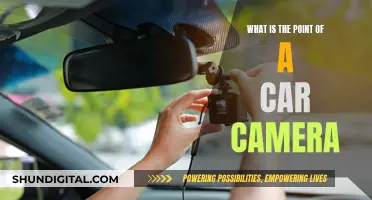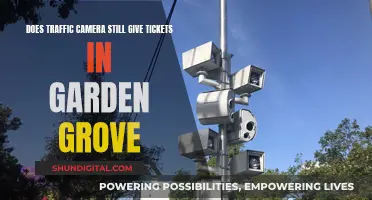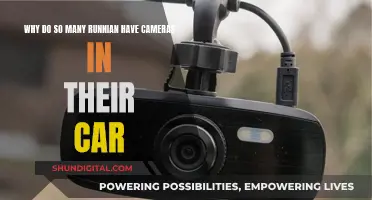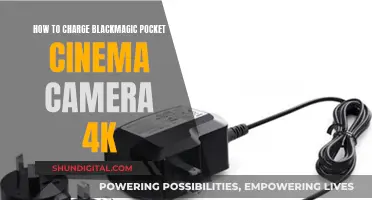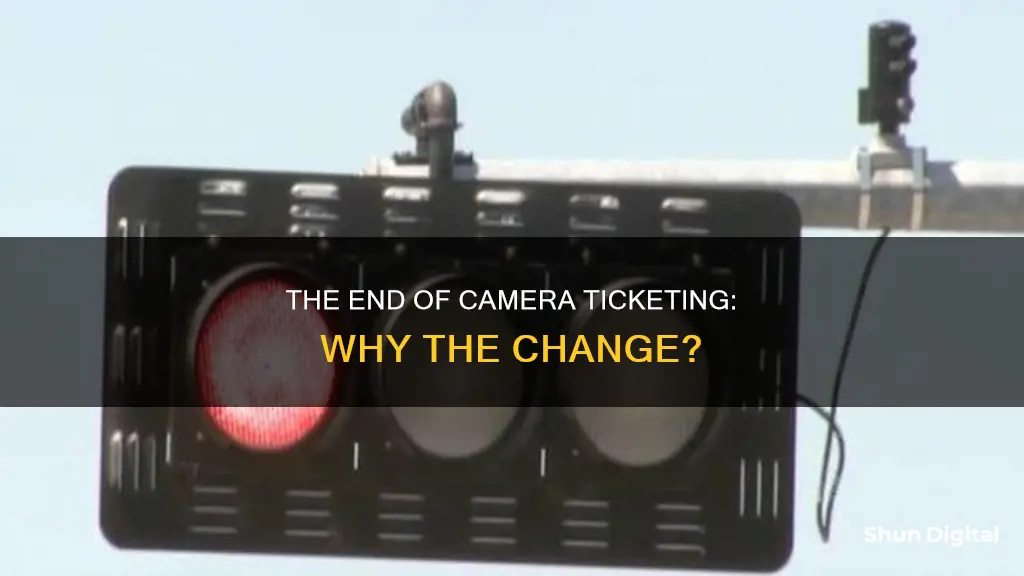
The use of cameras for ticketing is a highly controversial topic, with many people questioning their implementation from a public safety, privacy, and drivers' rights standpoint. While some states in the US have banned automated traffic cameras, others have restricted their use to specific circumstances or allowed local governments to set up their own camera programs. The controversy surrounding these cameras stems from various factors, including the potential for misidentification, equipment malfunctions, invasion of privacy, and the lack of trustworthiness of photo enforcement vendors. Additionally, the use of cameras for ticketing has been associated with an increase in accidents and a negative impact on consumer spending and tourism.
What You'll Learn

Misidentification and equipment malfunctions
Misidentification
In many cases, the registered owner of the vehicle is not the one driving the vehicle at the time of the violation. In such cases, the registered owner is not legally required to name the driver of the vehicle at the time of the violation. However, companies and organizations cannot file a declaration of non-responsibility.
Equipment Malfunctions
There are numerous documented instances of camera malfunctions and program dishonesty that target and burden innocent people. Camera operators have been found to be blatantly dishonest and will do anything to generate more revenue, including hiding evidence.
In Baltimore, Maryland, for example, a speed camera at the 2200 block of West Cold Spring Lane was set to ticket drivers as if the speed limit were 30 mph, when in fact, the limit for eastbound traffic is 35 mph. Baltimore officials now must issue refunds after 932 motorists were falsely accused, with the tickets would have been worth $37,280. Only 200 vehicle owners had paid the citation before motorist Brian Struckmeier blew the whistle on the speed limit error.
In another instance, a camera in Melbourne, Australia issued $26 million in bogus tickets a decade ago. Just last year, one in ten tickets issued in Baltimore, Maryland was based on a faulty speed reading.
In the UK, a Brighton Magistrates Court judge dismissed a speeding ticket when the prosecution's own calculation of the driver's speed from the photographs taken by the camera showed a 10% discrepancy, which is not allowed under UK law.
iPad Camera: What Materials Make It?
You may want to see also

Time and financial burden
The use of cameras for ticketing is a highly controversial topic, with several states and cities in the US banning their use altogether. One of the primary reasons for doing away with cameras for ticketing is the time and financial burden they place on drivers.
When a driver receives a citation from a traffic camera, they are faced with a difficult decision: take time off work to fight the ticket or simply pay the fine. Either option results in a loss for the driver. Fighting a ticket requires drivers to take time off work and incur legal costs, which can be a significant financial burden, especially if the ticket is upheld. On the other hand, choosing to pay the fine can also be costly, and drivers may feel pressured to do so to avoid the hassle and time commitment of contesting the ticket.
In addition, motorists who receive photo tickets are often at a disadvantage when it comes to mounting a defense. Weeks or even months may pass before a driver receives a citation, making it challenging to recall the details of the alleged violation. Furthermore, signs and road conditions may have changed during this period, making it difficult to collect evidence to support their case. This delay can result in a lack of recall and difficulty in gathering evidence, putting drivers in a challenging position to dispute the ticket.
The financial burden of camera-issued tickets can be significant, especially for those who are wrongly accused. In some cases, drivers may be fined hundreds of dollars for violations they did not commit, and the process of disputing these tickets can be time-consuming and costly. This can be a particular hardship for low-income individuals who may struggle to pay the fine or afford legal representation.
The use of cameras for ticketing has also been criticised for its impact on consumer spending and tourism. In several instances, cities have removed photo enforcement equipment in response to threats from locals and visitors who have vowed to avoid shopping in areas with such enforcement. This highlights the economic consequences of camera-based ticketing systems and the potential negative impact on local businesses and communities.
The time and financial burden associated with camera-issued tickets is a significant factor contributing to the move away from this enforcement method. Drivers face difficult choices, disadvantages in mounting a defence, and potential financial strain, all of which contribute to a sense of injustice and frustration.
Understanding PIR Mode on Trail Cameras: How Does It Work?
You may want to see also

Lack of driver recall and evidence
While traffic cameras are used in many states to enforce traffic laws, the practice is highly controversial and has raised questions about public safety, privacy, and drivers' rights. One of the main concerns with traffic camera ticketing is the lack of driver recall and evidence.
When a driver receives a citation from a traffic camera, they are often left defenseless due to the time lapse between the alleged violation and the issuance of the citation. By the time a driver receives the ticket, they may not be able to recall the details of the incident or collect evidence to defend themselves, as the signs and road conditions may have changed. This lack of recall and evidence can put drivers at a severe disadvantage if they decide to contest the ticket.
In addition, there is often a lack of transparency and accountability with traffic camera systems. Private corporations often operate these systems, and their inner workings are not subject to public scrutiny. The public has no way of knowing the strategies and techniques used by these corporations to increase the number of tickets issued, and there is no stated maintenance or audit program by any government authority to ensure the reliability and accuracy of the equipment.
The use of traffic cameras for ticketing can also deny drivers their due process rights. The Sixth Amendment's Confrontation Clause gives the accused the right to confront their accuser, but with camera tickets, drivers are not confronted by a police officer or given the opportunity to cross-examine the camera operators or handle the evidence. This lack of transparency and due process can make it difficult for drivers to trust the system and feel confident in their ability to defend themselves against unfair or inaccurate tickets.
Furthermore, the accuracy and reliability of traffic camera systems have been called into question. There have been instances of equipment malfunctions and misidentification, with tickets being issued to the wrong person. Without proper maintenance and oversight, it is challenging to ensure that the camera systems are functioning correctly and capturing accurate data.
In summary, the use of traffic cameras for ticketing can lead to a lack of driver recall and evidence, creating a burden on drivers who wish to contest their citations. This, coupled with the lack of transparency, accountability, and respect for due process, has led to growing opposition to the use of traffic cameras for ticketing.
Lorex Security Cameras: Understanding Battery Life
You may want to see also

Increase in accidents
While red-light cameras are touted as devices that increase intersection safety, information is quickly surfacing that shows the inaccuracy of that belief. Several studies have shown an increase in collisions at red-light camera intersections. For example, a report by the Washington Post showed an overall increase in accidents at red-light camera intersections of 107%. Similarly, KATU News found a 140% increase in rear-end crashes at the intersections where red-light cameras were installed in Portland, Oregon.
In addition to increasing accidents, red-light cameras have also been criticised for being inaccurate and unfair. For instance, in California, automated red-light camera enforcement has been deemed an illegal and unfair system through which the government collects money from unsuspecting motorists. The state may have to refund millions of dollars to motorists who were fined because of this illegal system.
Despite the criticism, some studies have shown that red-light cameras can be effective at reducing accidents. According to the Insurance Institute for Highway Safety (IIHS), a 2017 study found that red-light cameras reduced the fatal red-light running crash rate by 21% and the rate of all types of fatal crashes at signalised intersections by 14%. In another study conducted in Oxnard, California, there was a 29% reduction in injury crashes at intersections with traffic signals using red-light cameras.
Red-light cameras are an automated way to monitor traffic and are usually placed in busy intersections where a high number of accidents occur. They are connected to traffic signals and sensors and automatically photograph vehicles that run a red light. The system works 24/7 and the camera captures any vehicle that doesn't stop during the red phase. Police officers or trained civilian employees then review the pictures or videos to verify that an infraction has occurred and, if so, tickets are issued to the owners of the offending vehicles.
Choosing the Right Batteries for Your Kodak Camera
You may want to see also

Lack of maintenance and audit of private camera vendors
The use of cameras for ticketing has been a controversial topic, with proponents arguing that it helps improve road safety and reduce accidents, while opponents raise concerns about the accuracy, privacy, and ethical implications of such technology. One of the significant concerns surrounding the use of cameras for ticketing is the lack of maintenance and audit of private camera vendors, which can lead to several issues.
Firstly, there is a lack of government oversight and regulation of private camera vendors and their equipment. This includes the absence of a stated maintenance or audit program by any government authority to ensure the reliability and accuracy of the cameras and their output. Without proper oversight, there is a risk that the cameras may not be calibrated correctly or maintained properly, leading to inaccurate data and ticketing.
Secondly, the use of private camera vendors can lead to potential conflicts of interest and a lack of transparency. For example, in some cases, camera vendors have been involved in developing the violation criteria that cities use to determine what constitutes a violation. This close relationship between the vendors and law enforcement agencies can create an incentive for the vendors to maximize the number of tickets issued, potentially compromising fairness and objectivity.
Thirdly, the lack of maintenance and audit of private camera vendors can result in equipment malfunctions and reliability issues. The sensitive photo enforcement electronics are often left unattended and exposed to harsh weather conditions, raising questions about their reliability and accuracy. Additionally, equipment vendors often refuse to disclose their equipment reliability and error rates, making it difficult to assess the accuracy of the ticketing data.
Furthermore, the use of private camera vendors can lead to concerns about data security and privacy. Without proper maintenance and audit, there is a risk that personal information collected through the cameras may be vulnerable to unauthorized access or misuse. This includes not only data related to vehicle registration but also potentially sensitive information about individuals' movements and activities.
Lastly, the financial arrangements between governments and private camera vendors can be a cause for concern. In some cases, a significant portion of the revenue generated from camera ticketing goes to the private vendors, raising questions about the profitability of these operations and the potential influence on law enforcement agencies.
Overall, the lack of maintenance and audit of private camera vendors in the context of ticketing can lead to issues related to accuracy, reliability, transparency, data security, and potential conflicts of interest. Proper oversight and regulation are necessary to address these concerns and ensure the fair and ethical use of camera technology for ticketing purposes.
Waylens Camera: Exploring USB Mode Functionality
You may want to see also


